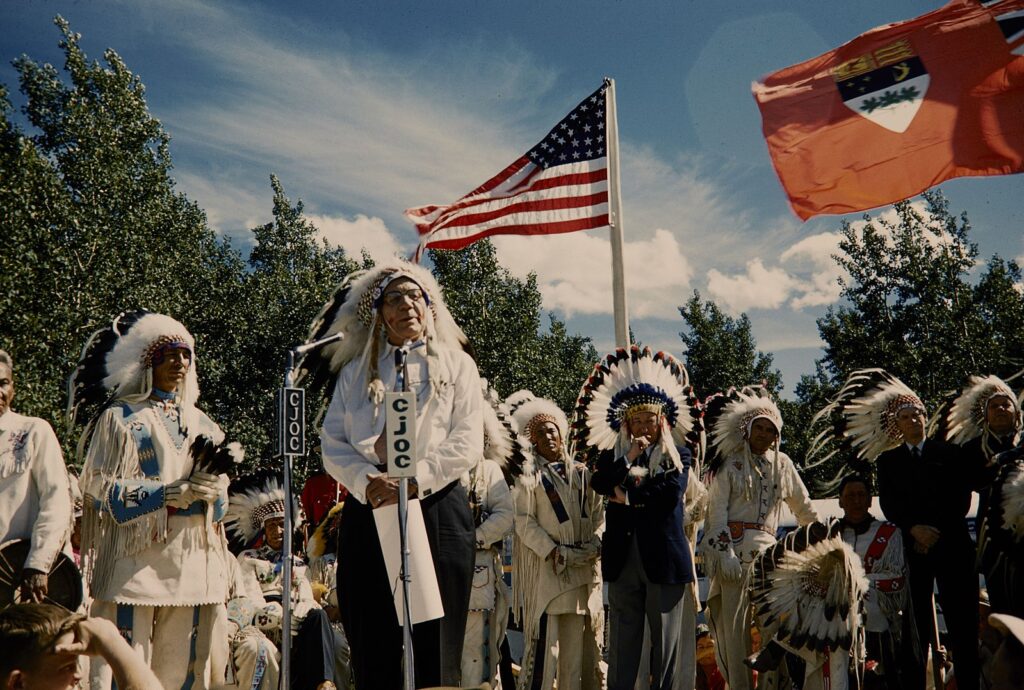

 Photo by Jack E. Boucher, via Wikimedia Commons (Public Domain)
Photo by Jack E. Boucher, via Wikimedia Commons (Public Domain)
We are excited to launch a new blog series celebrating the Fourth World Journal Special Issue: Nations International Criminal Tribunal (NICT), Volume 25(1), Summer 2025. Alongside article highlights and video excerpts from our contributors, this issue marks a significant milestone: the journal is now open access, making its content freely available to all. Each blog post in the series will include a link to the full article featured.
This landmark issue highlights the NICT—a historic, Indigenous-led initiative rooted in the pursuit of restorative justice and collective healing. The special edition brings together a range of voices who expand upon the vision of Indigenous-led justice articulated in the foundational Charter. Contributors critically examine the harms of Western legal epistemologies and colonial systems on Indigenous sovereignty, while emphasizing Indigenous resilience as a transformative force within national and international legal frameworks.
The blog series opens with an introduction by Guest Editor Hiroshi Fukurai, who offers an overview of the journal and outlines the purpose of the NICT as a response to crimes often ignored by existing international legal instruments—such as ethnocide, femicide, ecocide, and culturcide. He explores how the NICT seeks to elevate Indigenous customary law, hold perpetrators accountable, and inspire legal innovation. The opening piece also sets the stage for the six articles in the journal, each engaging with the Charter from a distinct perspective.
Dr. Fukurai presents the Charter, framing the core theme that shapes this special edition.
By Hiroshi Fukurai, Ph.D.
Dr. Fukurai constructs an overview of this issue, its engagement with the Nations International Criminal Tribunal (NICT), and the perspectives that drive its articles. The necessity for an Indigenous-centered judicial body within the world system is not novel, and the NICT derives from centuries of Indigenous resistance against the Westphalian statist system. Yet the NICT took shape as a robust structure for accountability and justice based on the work of CWIS founder Dr. Ryser, who ensured that the NICT covered crimes previously excluded from human rights governance, including ethnocide, femicide, ecocide, and culturcide. The piece begins with a discussion of the historical roots of the NICT in various resistance movements, as well as its legal precedents in the League of Nations and the Permanent Court of International Justice. The corpus of the NICT is expansive in defining genocide and proactively enforcing accountability mechanisms. Next, it outlines the six articles published and the various lenses through which the court is presented. Finally, it evaluates future directions for the NICT, examining its unique potential to advance both humanistic and ecological aims. These findings underscore the agency of Indigenous nations in sculpting alternative modes of anticolonial sovereignties.

Dr. Fukurai is a professor of Sociology and Legal Studies at the University of California, Santa Cruz, and former President of the Asian Law & Society Association specializing in lay adjudication, Asian law and politics, Original Nation Approaches to Inter-National Law (ONAIL), private international law, and race and law. He is a co-founder of the Collaborative Research Network (CRN) “East Asian Law and Society” and the International Research Collaborative (IRC) “The State and the Corporation as Legal Fictions: Original Nation and Dissent” within the Law and Society Association (LSA). Currently, he serves on the LSA’s Trustee Board for a second term and is a member of the Editorial Board of its flagship journal, Law & Society Review.
He has published over 50 peer-reviewed articles and authored 8 books, including People’s Prosecution Review Commissions & Japan’s Prosecution (2022); Original Nation Approaches to Inter-National Law: The Quest for the Rights of Indigenous Peoples and Nature in the Age of Anthropocene (2021); Civil Jury Trials will Democratize Japan (2020); East Asia’s Renewed Respect for the Rule of Law in the 21st Century (2015); Japan and Civil Jury Trials: The Convergence of Forces (2015) and Nuclear Tsunami (2015); Race in the Jury Box: Affirmative Action in Jury Selection (2003).
The library is dedicated to the memory of Secwepemc Chief George Manuel (1921-1989), to the nations of the Fourth World and to the elders and generations to come.
access here